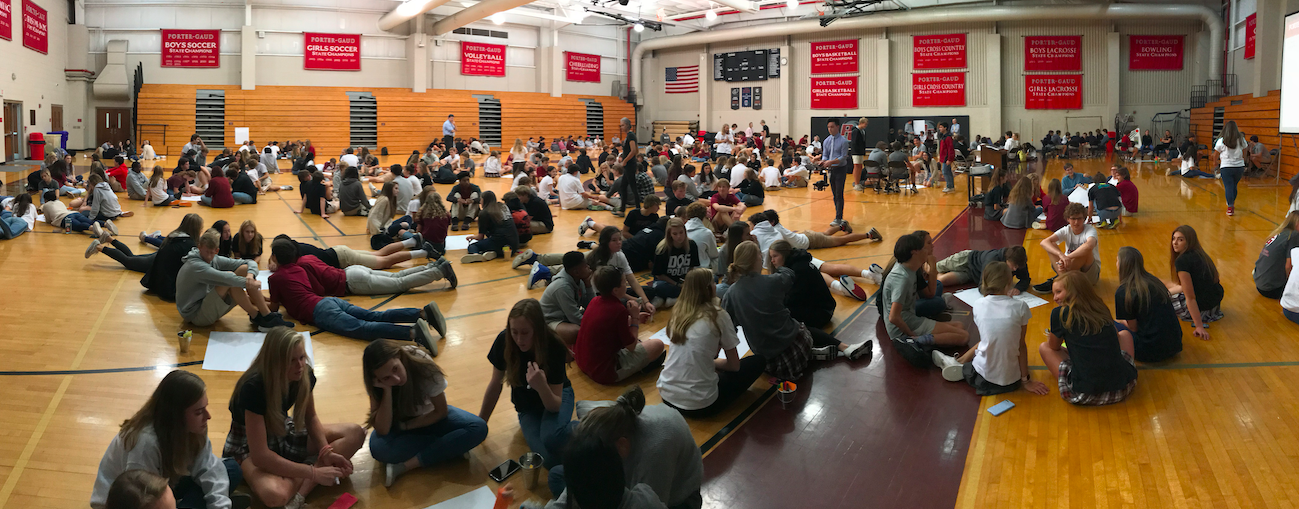Perhaps the most powerful driver of traditional, standards-focused education in America is the sense that we have fallen behind many countries in student performance. In our sound-bite world, the nexus of this concern are the results of international exams of math, reading, and writing. As I have written in the past, educators for whom I have a great deal of respect come down on both sides of this discussion: these exams either accurately indicate the inability of our students to compete in an ever-more competitive world, or they inaccurately and/or irrelevantly measure rote content memorization that will not indicate future success in a world that increasingly rewards creativity and innovation.
 I have finished reading Yong Zhao’s new book, Who’s Afraid of the Big Bad Dragon: Why China Has the Best and Worst) Education System in the World, that covers this question by focusing on China, where students in Shanghai have scored at the top of the international PISA exams. Zhao traces the history of the Chinese system of education and exams through millennia, where doing well on tests has been the best, and in fact usually the ONLY, way for young people to improve their socio-economic status from that of their parents. His thesis is summarized by:
I have finished reading Yong Zhao’s new book, Who’s Afraid of the Big Bad Dragon: Why China Has the Best and Worst) Education System in the World, that covers this question by focusing on China, where students in Shanghai have scored at the top of the international PISA exams. Zhao traces the history of the Chinese system of education and exams through millennia, where doing well on tests has been the best, and in fact usually the ONLY, way for young people to improve their socio-economic status from that of their parents. His thesis is summarized by:
China, a perfect incarnation of authoritarian education, has produced the world’s best test scores at the cost of diverse, creative, and innovative talents.
Chinese schools exist for test prep. In most schools the last year of high school is reserved exclusively for test preparation. No new content is taught.
Students are tested regularly and frequently: every term, month, and in some cases every week. They are then ranked based on their test scores, and every rank is publicized.
If the United States and the rest of the West are concerned about being overtaken by China, the best solution is to avoid becoming China.
Zhao goes on to develop an argument that is so rich in irony as to be truly painful. Despite their centuries-long tradition relying on highly competitive objective examinations, the Chinese realized that such emphasis was responsible for graduates who were great at taking tests, but lacking in the innovation and invention at which the West has excelled for the past several centuries. Lacking some change in their system of test-based education, even the rigid, controlling, authoritarian Chinese government has realized that they will continue to lag in a post-industrial modern world:
Outside observers praise the hard-working Chinese students, but those students, their parents, and their government have all been cursing the academic workload for decades. Since the 1950’s, the government has been working to reduce students’ load and pressure. As recently as 2013, the Ministry of Education issued another stern order to all schools to limit the frequency of testing the amount of homework.
Chinese parents, students, teachers and schools are all playing the prisoner’s dilemma game. Knowing or assuming that others will continue to do more homework, seek private tutoring, and prepare for tests, very few parents, children and schools would choose to voluntarily reduce the work load for fear of losing the game.
Thus we have this paradox: while many Western observers envy China’s PISA performance, the Chinese are working hard to dismantle the factors responsible for that success.
While I have not parsed the data nearly as closely as others, it is clear that American students underperform students in China and many other countries in many academic subjects. The data indicate that performance is related to many drivers, including how much time students spend in school, and the effectiveness of learning practices in our traditional classrooms. Zhao and others argue compellingly that other factors, including poverty and family relationships, are more indicative of student performance than how many hours students spend in class, or how much homework they are required to do.
The tunnel-like focus of public education leaders on test performance fogs what many of us, including, according to Zhao the Chinese government, have identified as the real problem. Virtually everyone I have interviewed in the last two years, including thousands of educators, parents, and students, believe that our North Star has shifted, that these standards-based exams only measure a fraction of what will be important to our students. No one argues that content knowledge is relevant, but a fixation on test scores, competing with students like the Chinese who are pursuing excellence on tests for reasons that they, their parents, and even their government understand are counter-productive, is a circular argument which, were it not so important to our students, would be comedic.
Many of us are caught in the prisoner’s dilemma that Zhao references. As a parent asked at one of my community book events this week, “If this is what the colleges want, how can a parent choose another direction for their child?” The courageous leaders, and right now they are substantially in the minority, advocate for doing what we know to be right, not what is easy or expedient.
Will we stay trapped in the pit of this false choice, that the only way for students to excel at content knowledge is to forsake the power of relevant, engaged, rich, contextual learning because we and our leaders are incapable or unwilling to dig below the sound-bite level of understanding? Who blinks first? Which schools, regions, states, or countries will leverage and reward questioning, creativity, and invention and which will reward obedience, repetition, and narrow-mindedness?





Grant,
Great post! I like the juxtaposition of the U.S. chasing China’s test performance while China is chasing our knowledge/application performance. How ironic that neither system has gotten us where we should be.
I have seen multiple instances of educators forsaking the test-driven and accountability at all costs mindset that has permeated our educational culture. What they have in common, I think, is teachers having the confidence in their teaching toolbox and artistry to “close their door” and do what they know their kids need. When their children perform well on the tests we all hate (it’s not really the tests we hate, I believe, but the one size fits all, magic pill label that leaders have espoused to tests), these teachers smile and celebrate because they have “beaten the system” while serving their students. So our opportunity is how do we scale this in our learning circles? Having us as leaders seek ways to grant freedom, permission, and trust to our most precious resource (human capital) is a good beginning. How Might We?
It is happening, but, yes, scale is a real issue. And of course there is no sure thing that those who favor more standardized testing are not going to win the day.